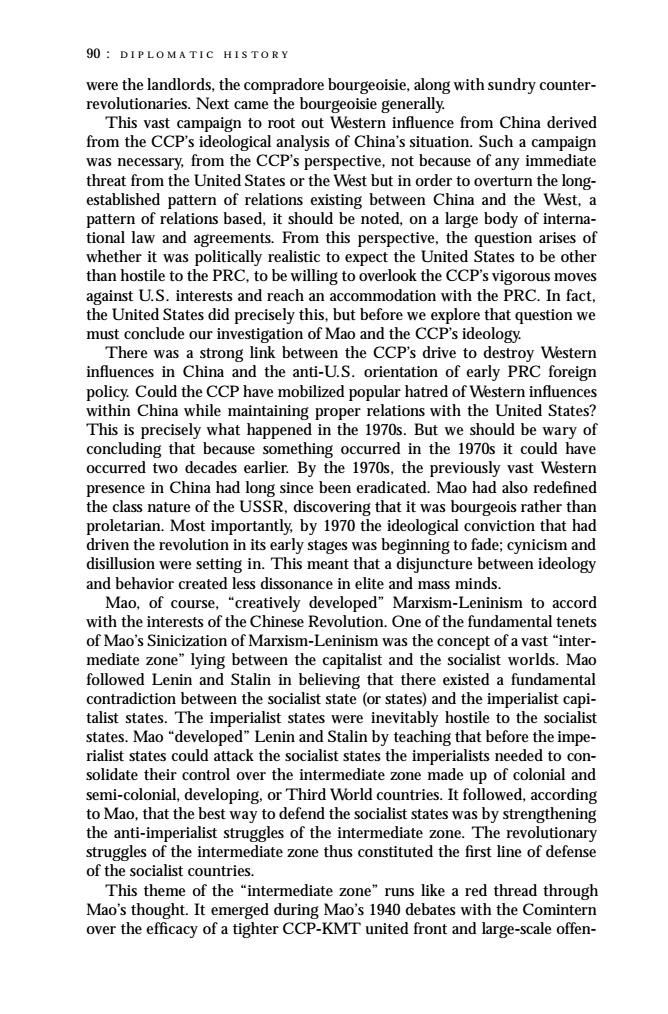正在加载图片...

90:DIPLOMATIC HISTORY were the landlords,the compradore bourgeoisie,along with sundry counter- revolutionaries.Next came the bourgeoisie generally. This vast campaign to root out Western influence from China derived from the CCP's ideological analysis of China's situation.Such a campaign was necessary,from the CCP's perspective,not because of any immediate threat from the United States or the West but in order to overturn the long- established pattern of relations existing between China and the West,a pattern of relations based,it should be noted,on a large body of interna- tional law and agreements.From this perspective,the question arises of whether it was politically realistic to expect the United States to be other than hostile to the PRC,to be willing to overlook the CCP's vigorous moves against U.S.interests and reach an accommodation with the PRC.In fact, the United States did precisely this,but before we explore that question we must conclude our investigation of Mao and the CCP's ideology. There was a strong link between the CCP's drive to destroy Western influences in China and the anti-U.S.orientation of early PRC foreign policy.Could the CCP have mobilized popular hatred of Western influences within China while maintaining proper relations with the United States? This is precisely what happened in the 1970s.But we should be wary of concluding that because something occurred in the 1970s it could have occurred two decades earlier.By the 1970s,the previously vast Western presence in China had long since been eradicated.Mao had also redefined the class nature of the USSR,discovering that it was bourgeois rather than proletarian.Most importantly,by 1970 the ideological conviction that had driven the revolution in its early stages was beginning to fade;cynicism and disillusion were setting in.This meant that a disjuncture between ideology and behavior created less dissonance in elite and mass minds. Mao,of course,"creatively developed"Marxism-Leninism to accord with the interests of the Chinese Revolution.One of the fundamental tenets of Mao's Sinicization of Marxism-Leninism was the concept of a vast "inter- mediate zone"lying between the capitalist and the socialist worlds.Mao followed Lenin and Stalin in believing that there existed a fundamental contradiction between the socialist state (or states)and the imperialist capi- talist states.The imperialist states were inevitably hostile to the socialist states.Mao"developed"Lenin and Stalin by teaching that before the impe- rialist states could attack the socialist states the imperialists needed to con- solidate their control over the intermediate zone made up of colonial and semi-colonial,developing,or Third World countries.It followed,according to Mao,that the best way to defend the socialist states was by strengthening the anti-imperialist struggles of the intermediate zone.The revolutionary struggles of the intermediate zone thus constituted the first line of defense of the socialist countries. This theme of the "intermediate zone"runs like a red thread through Mao's thought.It emerged during Mao's 1940 debates with the Comintern over the efficacy of a tighter CCP-KMT united front and large-scale offen-90 : D I P L O M A T I C H I S T O R Y were the landlords, the compradore bourgeoisie, along with sundry counterrevolutionaries. Next came the bourgeoisie generally. This vast campaign to root out Western influence from China derived from the CCP’s ideological analysis of China’s situation. Such a campaign was necessary, from the CCP’s perspective, not because of any immediate threat from the United States or the West but in order to overturn the longestablished pattern of relations existing between China and the West, a pattern of relations based, it should be noted, on a large body of international law and agreements. From this perspective, the question arises of whether it was politically realistic to expect the United States to be other than hostile to the PRC, to be willing to overlook the CCP’s vigorous moves against U.S. interests and reach an accommodation with the PRC. In fact, the United States did precisely this, but before we explore that question we must conclude our investigation of Mao and the CCP’s ideology. There was a strong link between the CCP’s drive to destroy Western influences in China and the anti-U.S. orientation of early PRC foreign policy. Could the CCP have mobilized popular hatred of Western influences within China while maintaining proper relations with the United States? This is precisely what happened in the 1970s. But we should be wary of concluding that because something occurred in the 1970s it could have occurred two decades earlier. By the 1970s, the previously vast Western presence in China had long since been eradicated. Mao had also redefined the class nature of the USSR, discovering that it was bourgeois rather than proletarian. Most importantly, by 1970 the ideological conviction that had driven the revolution in its early stages was beginning to fade; cynicism and disillusion were setting in. This meant that a disjuncture between ideology and behavior created less dissonance in elite and mass minds. Mao, of course, “creatively developed” Marxism-Leninism to accord with the interests of the Chinese Revolution. One of the fundamental tenets of Mao’s Sinicization of Marxism-Leninism was the concept of a vast “intermediate zone” lying between the capitalist and the socialist worlds. Mao followed Lenin and Stalin in believing that there existed a fundamental contradiction between the socialist state (or states) and the imperialist capitalist states. The imperialist states were inevitably hostile to the socialist states. Mao “developed” Lenin and Stalin by teaching that before the imperialist states could attack the socialist states the imperialists needed to consolidate their control over the intermediate zone made up of colonial and semi-colonial, developing, or Third World countries. It followed, according to Mao, that the best way to defend the socialist states was by strengthening the anti-imperialist struggles of the intermediate zone. The revolutionary struggles of the intermediate zone thus constituted the first line of defense of the socialist countries. This theme of the “intermediate zone” runs like a red thread through Mao’s thought. It emerged during Mao’s 1940 debates with the Comintern over the efficacy of a tighter CCP-KMT united front and large-scale offen-